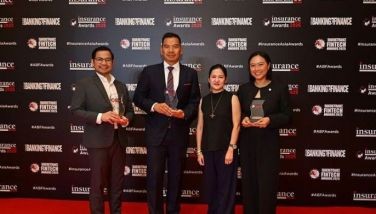Summer on my reading list
April 22, 2007 | 12:00am
While summer is often associated with the beach and frenzied outings with my sons, there’s also the other aspect of lengthier downtime in the evenings and late nights, when there’s nothing like getting engrossed in a good novel. Three recent fiction releases that I picked up at Fully Booked have a lot to offer and get my full marks!
The Book Thief by Markus Zusak  Reminiscent of The Boy in the Striped Pajamas of John Boyne, The Book Thief reasserts the notion that in this day and age, something original and entertaining can still be written about the Second World War. Narrated by Death, the book follows the life of nine-year-old Liesel, who lives with a foster family in a town near Munich. The "magic" of this novel comes in the form Zusak has taken to relate his themes of the love for books, how tolerance and compassion can be found in the most unexpected places, and how humanity can come in all sorts of shapes and sizes. The back story for much of what happens in the main plot is what rivets us page after page. While at times, the very simple manner of storytelling seems to approximate a children’s book, the themes and "food for thought" that’s constantly served up makes this novel one of my early favorites of the year. What’s especially original is how Zasuk chooses a common German girl to be the center of his novel. Liesel is a delightful creation and we eagerly follow her every exploit and reflection of the War that surrounds her and circumscribes her young life.
Grotesque by Matsuo Kirino  The best way to describe Japan’s celebrated female crime writer Matsuo Kirino is to think of a more cerebral John Grisham. This writer packs a wallop, and while the plot may not have as many twists and turns as Grisham or Le Carre, the deft character studies and psychological detail more than make up for the more straightforward storyline. Two Tokyo thirty-something prostitutes are murdered; while 10 months separate the murders, it turns out that both girls studied at a very exclusive private high school years before. The first prostitute murdered, Yuriko, is a Eurasian beauty, whose older sister, was a classmate of Kazue, the second prostitute murdered. Kazue was working at a respectable engineering firm and it surprises everyone that she had led a double life of prostitution. Kirino takes us on a whirlwind of first person narratives  the psychologically crippled elder sister, Yukiko’s diary, the Chinese national accused of the murders (he readily admits to the first, but insists he had nothing to do with the second), and Kazue’s journal entries. It’s all fascinating stuff, showing us the psyche of the modern Japanese, while keeping the unraveling of the murder mystery in sharp focus.
Exit A by Anthony Swofford  Swofford is best known as the author of Jarhead, and this is his first novel. Spanning the years between 1989 and 2005, the novel’s central location is the big American air base of Yokota, on the outskirts of Tokyo. When we first meet him, 17-year-old Severin Boxx is a football star of the local high school and son of a base colonel. The apple of his eye is Virginia Kindwall, the base general’s daughter. A hafu (half-American, half-Japanese), Virginia is that rebellious daughter, seeking her identity, and leaving a wake of destruction and confusion behind her. She gets mixed up with gangsters, political activists and the like. Exit A refers to the netherworld that exists right outside the base  a mélange of sushi and noodle shops, tattoo and pachinko parlors, strip clubs, whorehouses and comic book stores. The story is a strong, visceral one about redemption and the vicissitudes of love and life.
The Book Thief by Markus Zusak  Reminiscent of The Boy in the Striped Pajamas of John Boyne, The Book Thief reasserts the notion that in this day and age, something original and entertaining can still be written about the Second World War. Narrated by Death, the book follows the life of nine-year-old Liesel, who lives with a foster family in a town near Munich. The "magic" of this novel comes in the form Zusak has taken to relate his themes of the love for books, how tolerance and compassion can be found in the most unexpected places, and how humanity can come in all sorts of shapes and sizes. The back story for much of what happens in the main plot is what rivets us page after page. While at times, the very simple manner of storytelling seems to approximate a children’s book, the themes and "food for thought" that’s constantly served up makes this novel one of my early favorites of the year. What’s especially original is how Zasuk chooses a common German girl to be the center of his novel. Liesel is a delightful creation and we eagerly follow her every exploit and reflection of the War that surrounds her and circumscribes her young life.
Grotesque by Matsuo Kirino  The best way to describe Japan’s celebrated female crime writer Matsuo Kirino is to think of a more cerebral John Grisham. This writer packs a wallop, and while the plot may not have as many twists and turns as Grisham or Le Carre, the deft character studies and psychological detail more than make up for the more straightforward storyline. Two Tokyo thirty-something prostitutes are murdered; while 10 months separate the murders, it turns out that both girls studied at a very exclusive private high school years before. The first prostitute murdered, Yuriko, is a Eurasian beauty, whose older sister, was a classmate of Kazue, the second prostitute murdered. Kazue was working at a respectable engineering firm and it surprises everyone that she had led a double life of prostitution. Kirino takes us on a whirlwind of first person narratives  the psychologically crippled elder sister, Yukiko’s diary, the Chinese national accused of the murders (he readily admits to the first, but insists he had nothing to do with the second), and Kazue’s journal entries. It’s all fascinating stuff, showing us the psyche of the modern Japanese, while keeping the unraveling of the murder mystery in sharp focus.
Exit A by Anthony Swofford  Swofford is best known as the author of Jarhead, and this is his first novel. Spanning the years between 1989 and 2005, the novel’s central location is the big American air base of Yokota, on the outskirts of Tokyo. When we first meet him, 17-year-old Severin Boxx is a football star of the local high school and son of a base colonel. The apple of his eye is Virginia Kindwall, the base general’s daughter. A hafu (half-American, half-Japanese), Virginia is that rebellious daughter, seeking her identity, and leaving a wake of destruction and confusion behind her. She gets mixed up with gangsters, political activists and the like. Exit A refers to the netherworld that exists right outside the base  a mélange of sushi and noodle shops, tattoo and pachinko parlors, strip clubs, whorehouses and comic book stores. The story is a strong, visceral one about redemption and the vicissitudes of love and life.
BrandSpace Articles
<
>
















